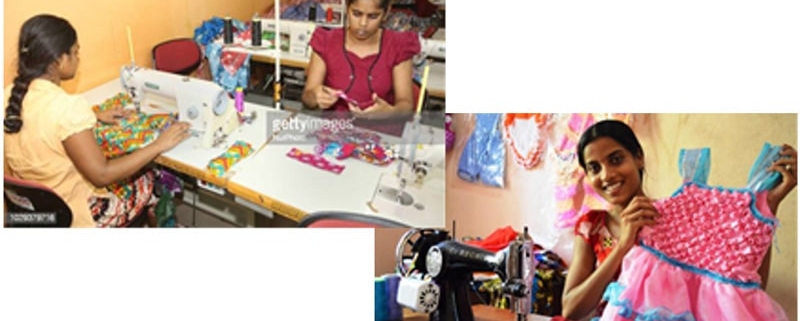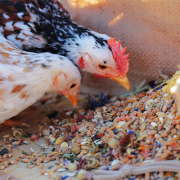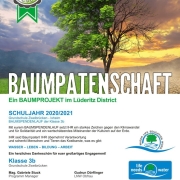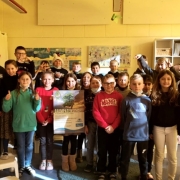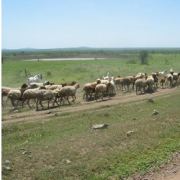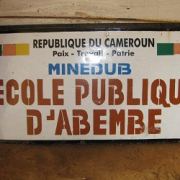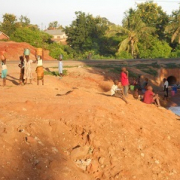Women’s Program SRILANKA 2022 – 2024
Women’s Program SRILANKA 2022 – 2024
“Life needs water,” with the kind support of the state of Carinthia and the help of our local project partner “one world foundation,” has been able to implement a training program for seamstresses and tailors in Sri Lanka. We would like to express our thanks to the Carinthian state government for their support and the opportunity to carry out this funding program.

PROJECT DESCRIPTION
a) Background/Current Situation:
“Life needs water” is focusing on education initiatives and women’s empowerment in Sri Lanka, particularly in response to the severe economic impact of the Covid-19 pandemic.
Together with our local partner organization “one world foundation,” which has successfully and sustainably implemented educational projects for decades, three disadvantaged and oppressed women are given the opportunity to participate in vocational training as seamstresses and tailors. This vocational training, along with the successful completion of a diploma, will significantly improve their livelihoods.
All three women come from rural regions severely affected by the pandemic, leading to immense poverty due to prolonged lockdowns.
Day laborers often could not earn money for their families for weeks. In March 2022, there was a dramatic devaluation of the currency by around 50%. Many people in Sri Lanka could not cope with this inflation and had to rely on external aid. Basic food supplies became scarce and expensive, and gasoline was unavailable for weeks. Poverty alleviation projects are now critical measures to initiate economic recovery.
These needy and oppressed women help in large family networks and support older generations. They lack the means to improve their living conditions independently.
Mrs. Dhameshi Wijerathna, Mrs. Dinesha Prasangika, and Mrs. Felicia Shenali submitted a request expressing their interest and motivation to participate in vocational training as seamstresses.
They spoke of how this would sustainably improve their livelihoods and enhance their quality of life. The training does not require any prior education. All three participants possess manual skills and creativity. They have all expressed their shared interest in the professional production of clothing. From their letters, it is clear that all three women are eager to undergo vocational training.
b) Motivation of the applicant for this project:
A member of “Life needs water” worked as a development aid worker in Sri Lanka in 2006. During this time, friendships and connections were made with locals and aid organizations. During the COVID-19 pandemic, requests for help came from already impoverished regions.
Life needs water wants to take on this challenge, and with the kind support of the state of Carinthia, implement a vocational training project for professional seamstresses, thus improving the living conditions of the three women and their families.
c) Project Objective/Goal:
Implementation of vocational training for three women from a rural region of Sri Lanka to become seamstresses and tailors. Through qualified training, they will be integrated into the workforce.
The goal is to provide the foundation for a secure income for their families through professional vocational training, turning them into skilled employees. This will combat poverty in rural areas.
In a second phase, after the completion of the first phase (vocational training) described in this application, “Life needs water” will support a startup program with the local partner organization, paying for rent, electricity, and operational costs for a sewing workshop.
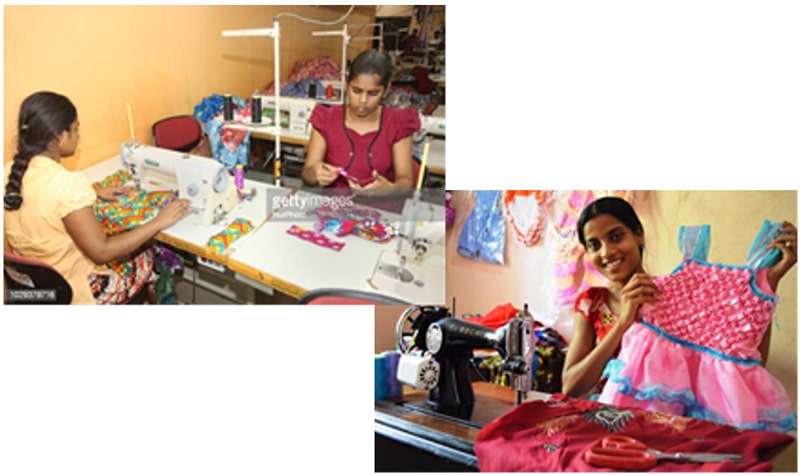
d) Specific Activities:
Step 1:
Basic training with a Certificate in Scientific Dressmaking Course at the Singer Fashion Academy in Talawathugoda, in close cooperation with one world foundation. The start is possible at any time. Duration: 4 months. The focus is on teaching theory. The participants have sent a letter to “Life needs water” and introduced themselves via video conference. Pre-registration has already taken place.
The goal of the basic training is to learn the craft of tailoring with two main focuses: 1:1 scale pattern drawing and professional sewing. In addition, participants will create their own clothing such as pants, blouses, shirts, jackets, and traditional clothing. They will learn proper body measurements, 1:1 pattern construction, and the step-by-step sewing process until the garment is completed.
The practical part of the first 4 months takes place in sewing workgroups with “one world foundation.” The focus is on familiarizing themselves with the sewing machines, stitch patterns, and routine tasks. The Singer Fashion Academy in Talawathugoda is easily accessible for the women, with only a 30-minute commute. However, the commute to Ahungalla for the practical seminars with “one world foundation” poses a challenge, as it requires a 2-hour train ride along the west coast heading south.
For this reason, a room will be rented with a host family, providing accommodation during the practical work. This creates a win-win situation for both the three women and the host family. To perfect their skills, it is essential to equip the trainees with sewing machines and other sewing tools.
Step 2:
Diploma in Scientific Dressmaking
Singer Fashion Academy Talawathugoda, Duration: 12 months
The goal of the diploma training is to learn bespoke tailoring for women and men, alterations, and the craftsmanship in textile and fashion design. In fashion design, participants learn how to create clothing and patterns, taking an idea from concept to final product. Beautiful fashion collections are created.
The practical training will once again be implemented in the form of practical seminars with “one world foundation.” After about one year, upon completion of the diploma exam, the vocational training for the three professional seamstresses will be completed.
Expected qualitative and quantitative outcomes:
Through professional vocational training as seamstresses and tailors, the three women will develop into qualified and professional seamstresses. The products they create will be needed in the market, and at the same time, they will have a secure livelihood through their work.

